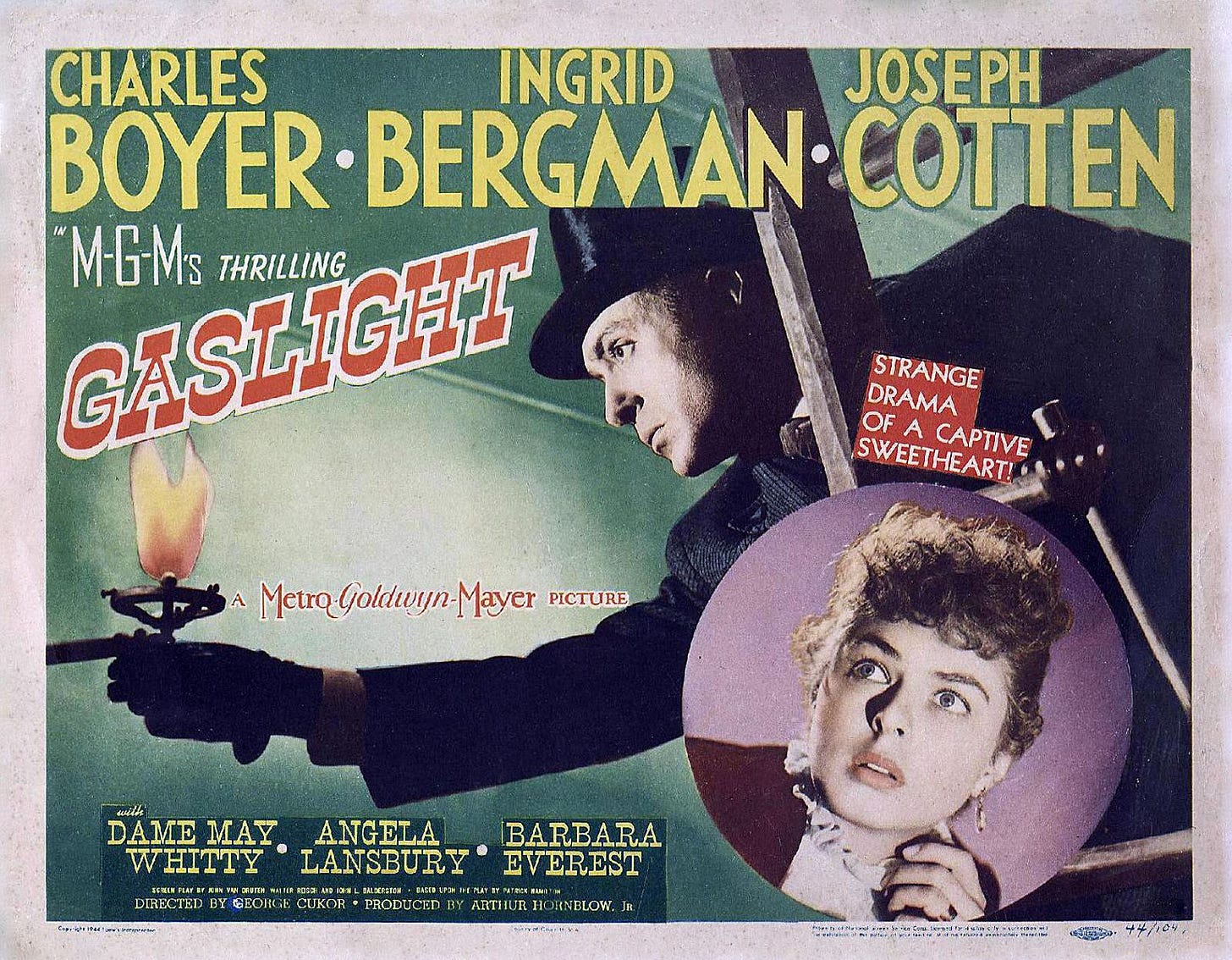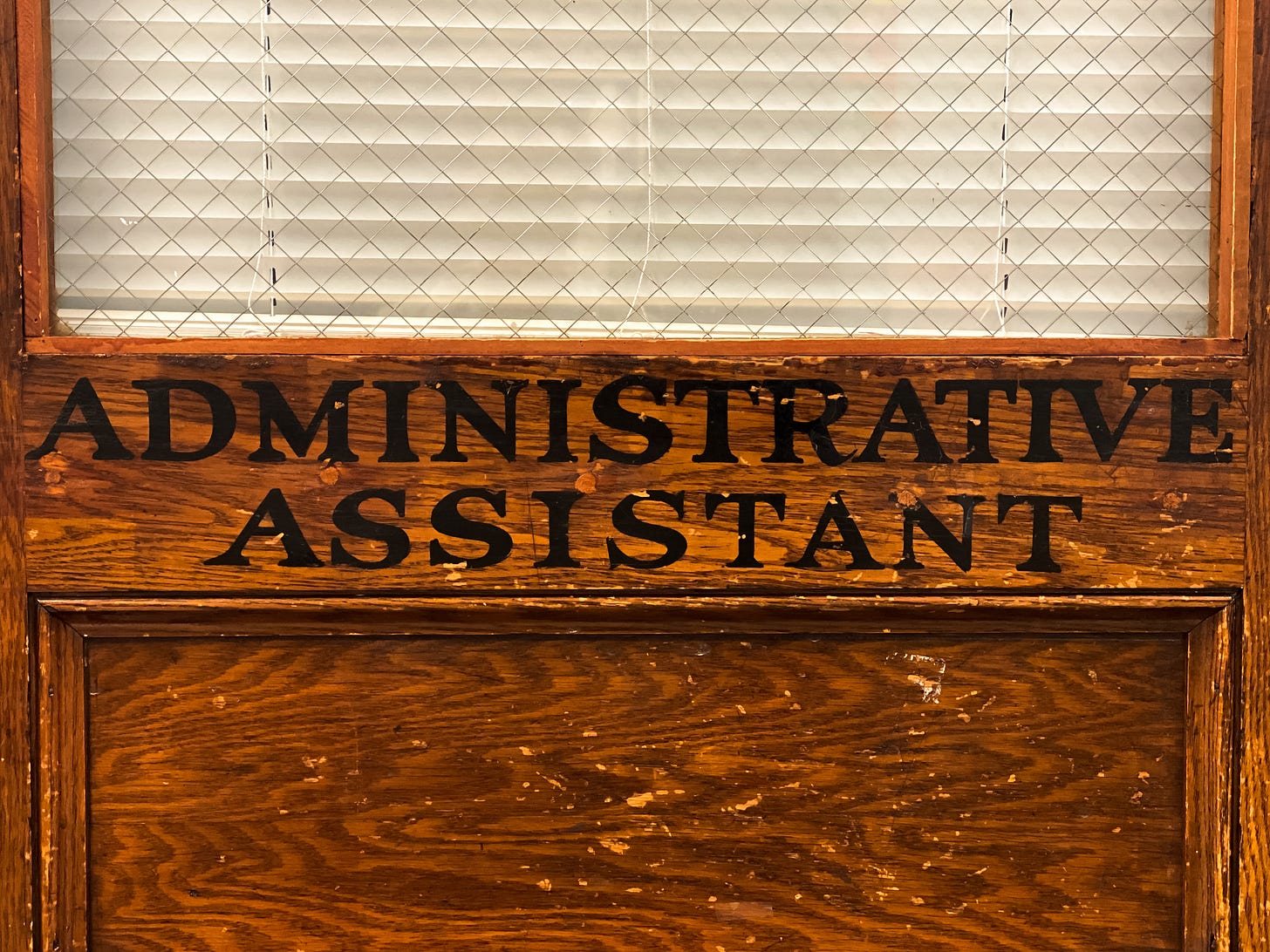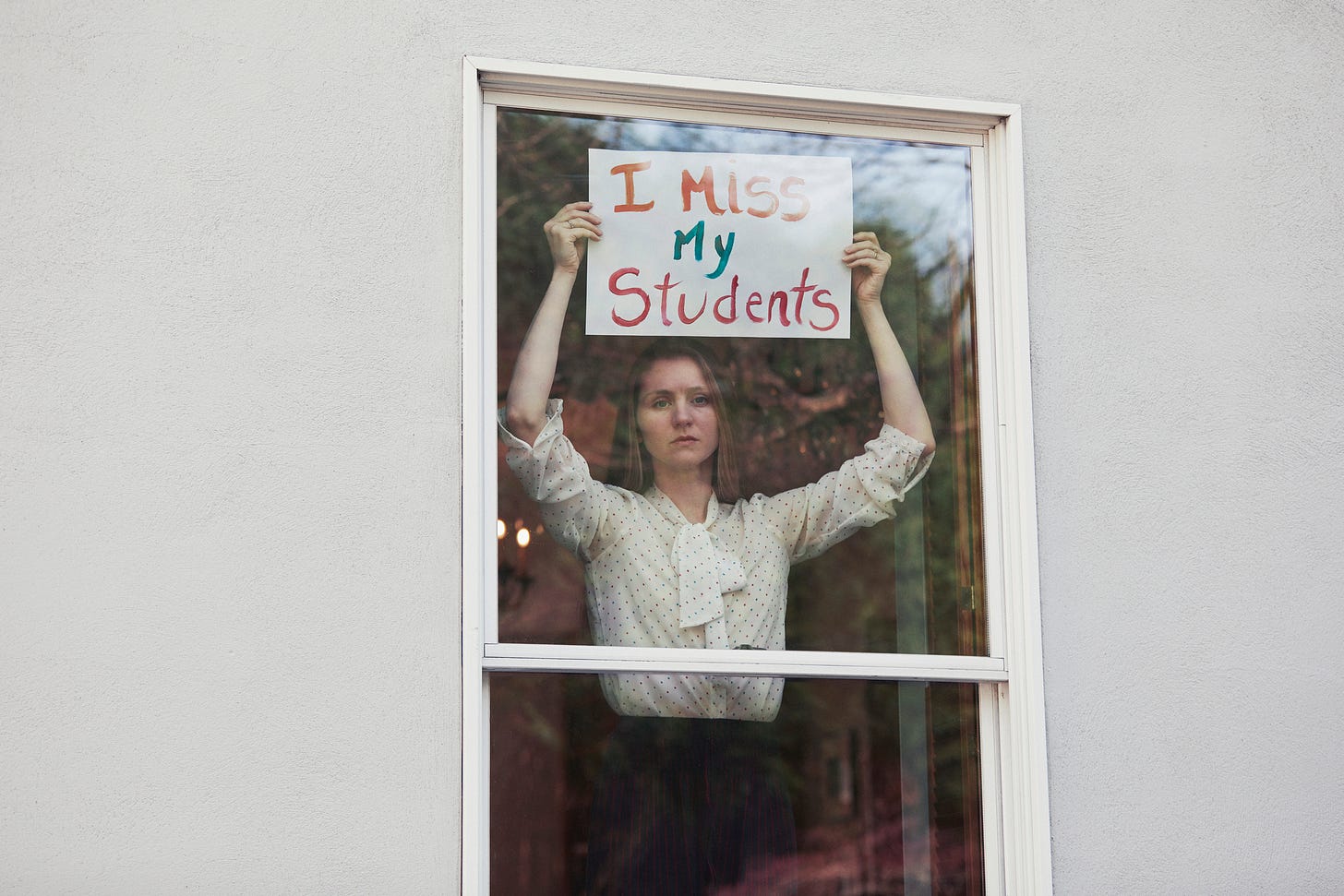The Price of Gaslighting
I knew I was being gaslit. That wasn’t enough to stop it.
I knew I was being gaslit
I had never given much thought to psychological warfare until I started teaching fifth grade. Almost immediately out of college, I got a job as a middle school English teacher at a New York City charter school. The position came with an abundance of red flags (prominent complaints, bad reviews from former teachers, discouragement from other educators), but I figured that as long as I was aware of them, I was safe.
This is now, I see, akin to hearing a shark warning and thinking, “the fact that I have heard this will surely protect me from sharks.” It won’t.
For a month, I lived inside an experimental psy-op. We were told to “buy in” to the vision, a loose collection of untested pedagogical philosophies that required utter adherence. Any misstep in training was met with public accusations of not being bought in and demands to explain why you were not bought in. You don’t believe in what you’re doing since you made a mistake, they told us. The presence of fear or nerves during public teaching demonstrations means that you don’t have enough conviction in the vision.
That’s not how human emotions work, I thought.
Learning submission
In a concerted effort to turn us into a submissive faculty, we were humiliated, intimidated, and threatened. One teacher told me that she wasn’t sleeping or eating because she was so stressed about the feedback the administration would give her. It seemed like we were being set up to fail so that they could berate us for failing.
Pushback from teachers was met with circular criticism that never made much sense. If you did something they didn’t like, they told you that you didn’t know what you wanted from your classroom. If you defended yourself and said that you did know what you wanted, they told you that clearly you didn’t; otherwise, you wouldn’t have made your incorrect decision. If you accepted the feedback and promised to implement it, they told you that your willingness to change meant that you didn’t know what you wanted from your classroom. It was the educational equivalent of a casino—the house doesn’t want you to win, so you won’t.
Losing my grip on truth
Truth was now something I had to wrestle with in a way I never needed to before. During a school-wide debrief, I was told that the positive events of my third-period class hadn’t happened. Despite the fact that no one from the administration had been in my classroom all day, they said this sort of achievement was impossible because I was not aligned enough with the vision to make it happen. Teachers are not a reliable source of information about their classes, they said to a room full of teachers. Only the administrators can see what’s really happening, whether they saw it or not.
Gaslighting, Merriam-Webster’s 2022 word of the year, takes its name from the 1944 thriller Gaslight, where a husband tries to psychologically break his wife by making her doubt her own sanity. An insidious, and often innocuous act of violence, it convinces the victim that their perception of reality is fundamentally flawed, requiring them to latch onto the reality created by the perpetrator. It is the ultimate form of control, not just over a person’s actions but over their experience of the world itself.
Due to gaslighting’s popularity in the cultural consciousness, it can be diluted or misinterpreted. Oftentimes, someone accused of gaslighting is just lying or is saying something that the listener doesn’t want to hear. What gaslighting does is not just convince a person that something is wrong; it convinces them that they cannot be trusted to interpret the world around them. It creates a dependent relationship where the victim is unable to function by themself. The gaslighter is just helping the victim see the truth because they don’t know any better.
But I knew better. It still worked.
Your reality is wrong
I was so aware of the gaslighting that it was difficult to get me to shut up about it. After the first day of training, where we were told that we were eligible for free telehealth therapy, I signed up and matched with a therapist who promptly told me to quit. But I was young, in need of money in one of the most expensive cities in America, and I loved teaching.
The real trouble came, as lots of my troubles do, from math. By the laws of statistics, not everything they said was wrong. Between their attempts to convince me that my reality was wrong, there was an astute observation or informed pedagogical suggestion. If they were right about some things, I thought, then maybe they were right about more. If I could recognize that some of the things they said about other teachers were true, then perhaps I was wrong about everything.
Maybe, instead of protecting myself, I was actually preventing myself from seeing the truth. Maybe they were right that the things that I saw in my classroom never actually happened. Maybe the administration did know more about reality than I did. After all, a stopped clock is right twice a day. But what good is that if you don’t know what time it is?
In her book The Gaslight Effect, psychologist Robin Stern argues the “gaslight tango” takes two. The victim must, in some way, be in an approval debt to the perpetrator. That search for approval is what makes reality malleable because the desire for approval on their terms, no matter how subconscious, becomes worth more than truth. Gaslighting and the willingness to be gaslit turns the perpetrator into a false god, lording over a fictional world where they get to decide on reality. It’s about control, and the only way someone can have complete control is by creating something themself.
False gods
Any god requires a stringent believer. When we hear things from “someone we trust or believe to be an authority or more knowledgeable, we’re going to likely hang onto that thought,” says Dr. Claire Wilhide, a psychotherapist who works with trauma patients. I would have sworn up and down that I despised the people I worked for. I had no respect for them, their teachings, or their organization. If they were a god, I would rather go to hell.
But I had spent 19 years of my life in school, and now I was working at one. My entire conscious life, there were always the same people above me–principals, presidents, or provosts. These were the only chain of command I had ever known. Even moving up a rung as an employee still kept me on the ladder. “There’s an element of belonging that is a key factor to gaslighting,” Dr. Wilhide says, which made me a particularly vulnerable target. I had belonged in the educational system as a student for most of my life, and even though I had nothing but contempt for the institution I was working for, I loved being a teacher. I wanted to be good at it in the eyes of my students and of my employers. Just as a seemingly random miracle can convince you of the existence of God, the occasional good advice from people that I could not shake wanting to please convinced me to believe in the false admin-god.
I had always believed that knowledge was power. But knowledge didn’t stop my separation from sanity; it seemed to compound it. I knew that the thoughts of “maybe they’re right, maybe I can’t see the truth” was their way of converting me to this false god, making me dependent on them for reality. And then, just like they had taught me to do, I would doubt what I knew. The god would grow a little larger, and I would lose a little bit more of my mind.
“You know what they’re saying isn’t true,” my father all but yelled at me over the phone. “But I don’t,” I said, the first time I had admitted it aloud. I didn’t know what was true anymore; the word ceased to have meaning. It was irreconcilable, I had thought; it’s either true, or it isn’t. Their vision can be true, or mine can. One thing they don’t tell you about being psychologically abused is the way it robs you of nuance.
Smashing the idol
Ultimately, it wasn’t the gaslighting that drove me to quit. Inexcusable things continued to happen, and I still had enough of a grip on reality to recognize them. I was sick of going home crying every day, and there are only so many times you can walk the same path through Brooklyn in tears before you worry about gaining a reputation. The day I quit, my best friend was waiting for me at the door of the school, a jar of celebratory pickles in hand. We ran down the block away from the school, and I pressed send on my resignation email once I could no longer see the building. I was afraid to face them, afraid they would chase me and hurt me, and afraid they would chase me and sweetly bring me back.
For a few days after quitting, I wandered–mentally, inside my apartment, through New York. I was relieved; in equal part, I was terrified. I sat in Central Park and wondered what my students were doing, if they missed me. I hadn’t told anyone I was leaving; I abandoned them. Did I abandon them? I made a clean break from a bad situation. I took care of myself.
While talking to Dr. Wilhide, she asked me if I had regained my grip on reality since quitting. Without realizing it, I laid down on the couch where I had been taking notes, assuming the classic “submitting to analysis” position. I said that I mostly had, partly because of the efforts of everyone around me validating what I had experienced as having actually occurred. Even in recovery, I couldn’t completely trust myself.
My sense of nuance has come back, much more slowly than I would like. Truth, I make sure to repeat, doesn’t belong to one person. They may have been right about some things, which still pains me to admit, but they were wrong about others. I should have said goodbye to my students, but it didn’t make me a monster. I was allowed to make mistakes. It didn’t mean I wasn’t bought into the vision or that I didn’t have conviction. It meant I wasn’t the product of a false god.
I still hear the voice of that false god, I told her, which sounds eerily like my own voice if you tossed it down a well with a pack of cigarettes. It’s getting fainter, though. With some more time, I think I can get her out of the well and to quit smoking.







What a lovely piece about a hard subject! It must have been difficult ( and I hope cathartic) to write. You endured a lot and came out wiser. I am so glad you walked away from that situation. Clean breaks are good. And… The jar of pickles celebration made me smile.
Outstanding!